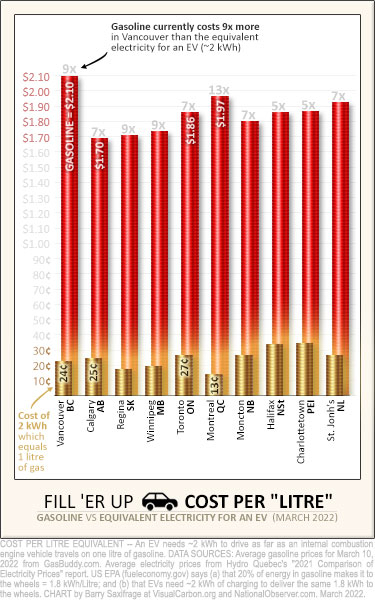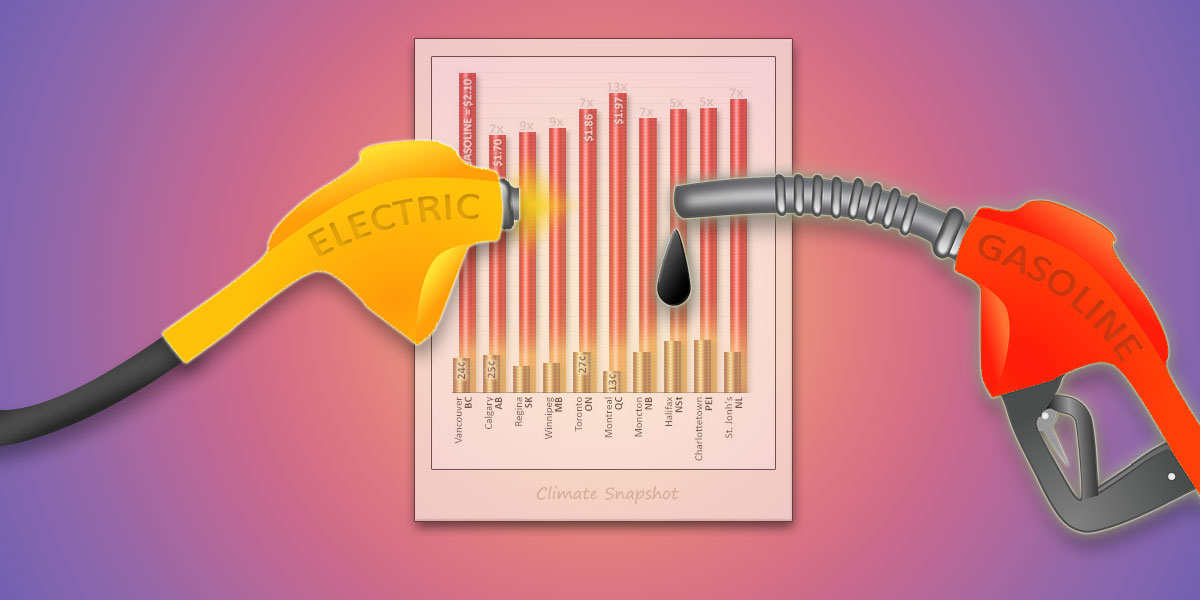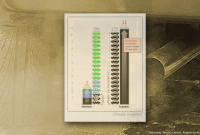Support strong Canadian climate journalism for 2025
Gasoline prices are surging. That's forcing owners of gasoline-burning cars to pay a lot more to drive around. In some areas of Canada, gasoline now costs more than $2 a litre.
Canadians who own electric-powered vehicles (EVs), however, are filling up for less than 35 cents per "litre equivalent." The reason EVs are so much cheaper to fuel is because they only require a quarter as much energy to drive them around. A rough rule of thumb for comparing fuel prices is that two kilowatt-hours (kWh) in an EV provides the same driving energy as one litre of gasoline does in a gasoline-burner. (See the endnotes for all the geeky details.)
My chart below lets you compare the current costs of filling up with gasoline versus electricity in major cities across Canada. Those tall red coin stacks show the average price for gasoline in each city right now. The short gold coin stacks show the local price for the litre equivalent of two kWh of electricity for an EV.

For example, the bars on the far left show that in Vancouver, it currently costs nine times more to drive with gasoline than with electricity. And since all of B.C.'s gasoline is imported, a lot of the money spent at the pump leaves the province. In contrast, filling EVs with made-in-B.C. electricity keeps those energy dollars and energy jobs in the province.
In many other cities — like Calgary, Toronto, Moncton and St. John's — gasoline currently costs seven times more to drive on than local electricity.
The biggest winners in Canada right now are EV drivers in Quebec. As the chart shows, charging an EV at home in Montreal costs around 13 cents per litre equivalent. Oh, and as a very nice bonus, Quebec's electricity is also 700 times less climate-polluting to drive on than burning gasoline. (Yes, 700 times cleaner … see endnotes for details.)
Despite electricity being many times cheaper and cleaner for Canadian drivers, only three per cent of the new passenger vehicles bought in Canada last year were all-electric EVs. That's five times fewer than the number Europeans bought. It's also fewer than Americans bought. It's even below the global average.
The reason our peers in many other nations are choosing electric over gasoline far more often is because their governments introduced policies that make EVs the better choice for them. These policies are helping their citizens lock in a future of lower fuel costs, less deadly air pollution and declining climate emissions.
If Canada's federal and provincial governments want to provide the same benefits to Canadians, they know how to do it. For example, Canada could adopt the policy package that has worked so spectacularly well in Norway — where 80 per cent of the new cars Norwegians buy now are all-electric EVs. If that northern oil-exporting nation can do it, surely ours can, too.
*********
Endnotes
- 2 kWh for an EV = 1 litre gasoline. This is the rough rule of thumb I used in this article to compare fuel costs. Here's the data and math:
One litre of gasoline — The U.S. Environmental Protection Agency (EPA) says a litre of gasoline contains 8.9 kWh of heat energy, but that just 20 per cent of that energy ends up turning the wheels. The rest is lost in friction and waste heat. That means each litre of gasoline supplies 1.8 kWh of driving energy (math: 8.9 kWh x 20% = 1.8 kWh).
A litre equivalent in electricity — EVs are far more energy-efficient. The EPA says that 88 per cent of the electricity put into an EV makes it to the wheels. So, to deliver a "litre equivalent" of 1.8 kWh in driving energy to the wheels requires fuelling an EV with two kWh from the grid (math: 2 kWh x 88% = 1.8 kWh). - CO2 from filling up in Quebec — Burning a litre of gasoline emits 2,350 grams of carbon dioxide (gCO2). Quebec's electricity emits 3.4 gCO2 to generate the litre equivalent of two kWh for an EV (see Canada's National Inventory Report, Part 3). That makes gasoline 700 times more climate-polluting to drive on than Quebec's electricity.
- Gas prices — The gas prices in my chart are per-litre averages for each city on March 10, according to the popular GasBuddy.com.
- Electricity prices — The electricity prices in my chart are the average cost in each city for two kWh (a litre equivalent), according to Hydro Quebec's "2021 Comparison of Electricity Prices in Major North American Cities" report.
- Fuel costs for average Canadian passenger vehicle — The average new car in Canada will burn 28,000 litres (21 tonnes of gasoline) over a 200,000-mile lifespan. At $1.50 per litre, the gasoline bill would add up to $42,000. At $0.14 per kWh, the electricity to drive an equivalent EV would cost $8,000.







Comments
Interesting arithmetic. Compare public transit in Metro Vancouver:
Sapperton to Metrotown = 10km; fare = $2.45 = $0.24 per kilometer. Capital cost = $0.00
Avg. gas use = 10 l/100 km = 1l per 10 km. Capita cost = $40,000 - $80,000 + insurance + service.
It's a no brainer: For personal costs over a vehicle's lifetime: $Transit << $Electric $ < Gasoline.
I did some spreadsheeting. Based on some average driving figures I found (for Ontario) and the cost difference in BC (because I live in BC), the savings is currently $230/month for an average driver.
Looking at a loan calculator, I concluded that a 7 year loan (which is the length of my car loan) at 4% interest paying $230 a month would be a loan for nearly 18,000 dollars. So if you buy an electric car, the break-even point currently is if it costs nearly $18,000 more. Maybe only $15,000 in some other provinces where gas isn't quite as expensive--yet.
Electric cars' sticker price is somewhat more expensive still than an equivalent ICE car. But even without the federal $5000 subsidy, or some provincial ones, they're not $15,000 more expensive. If you're gonna buy a car, electric is currently the clear choice.
A view from suburban Toronto:
" If you're gonna buy a car, electric is currently the clear choice."
Only *if* you are fortunate enough to have a place to plug it in, which many - probably most - drivers do not. At this point, EV ownership is largely limited to middle/upper-class homeowners with private driveways and the money for their own charging station, or else who live close to a public charging station. Can you spell "suburbia"?
As for urban and suburban tenants (whether in houses or high-rises), or even condo owners in older buildings? Forget it. They will have to keep driving their gas-burners from one sprawling suburb to another, for as long as it is legal. Then what will they do?
The basic problem really comes down to almost 100 years of urban design that leaves people with little choice other than private-automobile ownership - one car per adult per household! - along with social pressure and enormous economic interests pushing relentlessly in that same direction. But I doubt that the 401 will be any more attractive a place jammed solid for hours with EVs than it currently is with gas-guzzlers.
Transparency time: I park my beloved 13-year-old Prius on the street, outside a neighbour's house. There is no outside power at the leased industrial building where I work, and no, I cannot work from home. The fifty-year-old high-rise where I own a condo apartment would be no better, even if I moved back in there. So there is no EV in my foreseeable future; if I ever do have to buy another car (and I hope I don't), it will likely be another Prius.
You are describing a common, but solvable problem. It is feasible to install public charging stations on streets where many people park. In the UK, there are experiments with making street lamp posts into chargers. Condos that have underground parking can install Level 2 chargers. Workplaces in colder areas of Canada already have plugs for block heaters which can be upgraded to Level 2. Subsidies will be needed, but this problem can be addressed. Level 2 chargers will charge any EV overnight. They need 220 V/ 30 Amp circuits which are not very big.
Another interesting figure from this table to discuss is, why are the hydro rates for Toronto double those for Montreal? Answer: Hydro generation in Quebec is mostly from water powered generation, which is much cleaner and cheaper than Ontario's gas and Nuclear powered generation. Do why doesn't Ontario buy its hydro from Quebec instead of it being sold to the U.S.? Also, if Quebec can generate hydro for do little, why can't B.C. and Alberta?